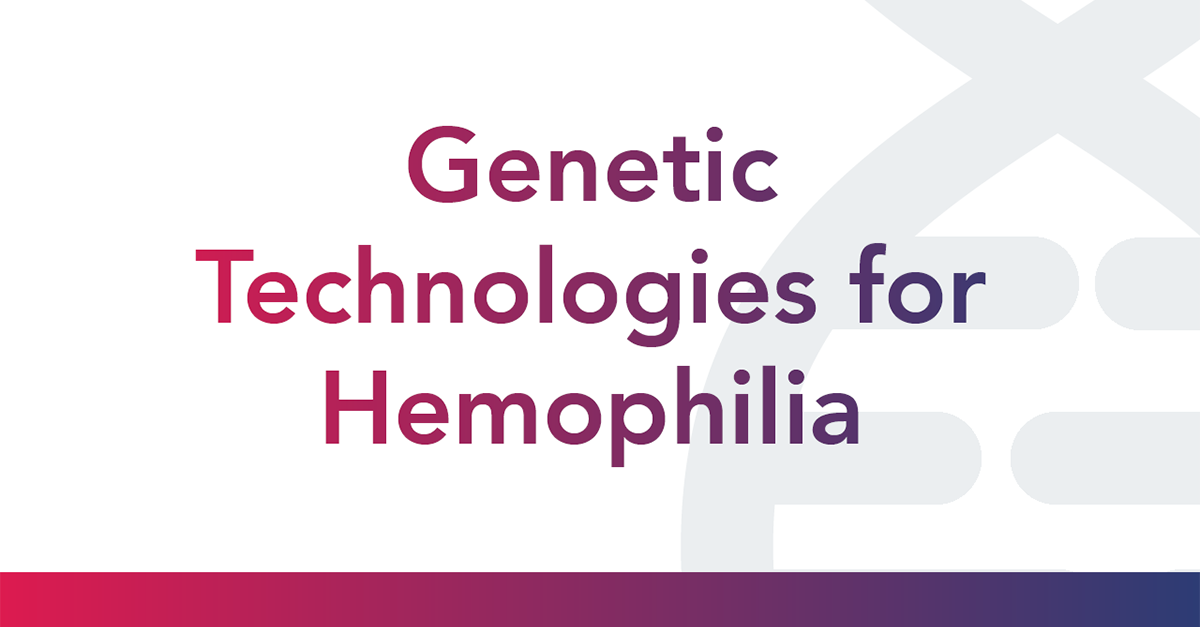
Genetic Technologies for Hemophilia
This information sheet is designed to help understand the similarities, differences, and current state of knowledge for the existing genetic
Year: 2022
Language: English
Author(s): World Federation of Hemophilia
Format: Congress recordings

In these sessions from the WFH 2022 World Congress, David Lillicrap, Len Valentino, Sophie Susen, Mrinal Gounder, Rebecca Kruse-Jarres, Christine Mrakotsky, Roger Schutgens, Dan Hart, Margaret Rand, Karina Meijer Waander van Heerde, Keith Gomez, Emna Gouider, Charles Nakar, Brian R. Long, Tiago Lopes, Claire Pouplard, Radek Kaczmarek, Johnny Mahlangu, Steve Pipe, K. Rajender Reddy, Pratima Chowdary, Alok Srivastava, Ulrike Reiss, Lei Zhang, Tsukasa Ohmori, Shannon Meeks, Carmen Escuriola, Renchi Yang, Wenman Wu, David Lillicrap, Heiner Weidemeyer, Amit Singal, Graham Foster, Manuel Carcao, Runhui Wu, Min Zhou, Emna Gouider, Robert Klamroth, Shashikant Apte, Cedric Hermans, Maria Elisa Mancuso, Angela Weyand, Alfonso Iorio, Amy Shapiro address current medical topics in bleeding disorders.
The WFH does not engage in the practice of medicine and under no circumstances recommends particular treatment for specific individuals. For diagnosis or consultation on a specific medical problem, the WFH recommends that you contact your physician or local treatment centre. Before administering any products, the WFH urges patients to check dosages with a physician or hemophilia centre staff, and to consult the pharmaceutical company’s printed instructions.
The WFH does not promote any particular pharmaceutical product and any mention of any commercial brand in this presentation is strictly for educational purposes.
In this session from the WFH 2022 World Congress, David Lillicrap (Canada), Len Valentino (United States), Sophie Susen (France) and Mrinal Gounder (United States) discuss that there has been significant advances and improvement in the lives of persons with a bleeding disorder. However, there is still much more to be accomplished for the underserved populations. The session will examine 3 important initiatives for the bleeding disorder community: NHF national research blueprint; Principles of care for management of women with bleeding disorders; and brining cures to von Willebrand disease.
In this session from the WFH 2022 World Congress, Rebecca Kruse-Jarres (United States), Christine Mrakotsky (United States), Roger Schutgens (Netherlands) and Dan Hart (United Kingdom) discuss cognitive and behavioral outcomes in children and young adults with hemophilia, updates from the eTHINK study; cardiovascular disease; and inhibitors in severe and mild hemophilia.
In this session from the WFH 2022 World Congress, Margaret Rand (Canada), Karina Meijer (Netherlands), Waander van Heerde (Netherlands) and Keith Gomez (United Kingdom) discuss application of novel therapeutics for rare bleeding disorders, current lab diagnostic workflow and next generation sequencing approaches.
In this session from the WFH 2022 World Congress, Emna Gouider (Tunisia), Charles Nakar (United States), Brian R. Long (United States), Tiago Lopes (Japan) and Claire Pouplard (France) present their highly scored abstracts on clinical research and clinical trials.
In this plenary from the WFH 2022 World Congress, Radek Kaczmarek (Poland) discusses phase 3 research, as well as multiyear follow-up in earlier phase studies, generated concerns regarding efficacy and short- and long-term safety, leading a reconsideration of AAV vector gene therapy. Liver toxicity, albeit typically mild, occurs in at least some patients in all haemophilia A and B trials within the first year and is poorly understood. Long-term safety will necessitate lifelong monitoring. This plenary will examine the pathways that will be crucial to developing mitigations and solutions to the remaining issues, including those who are unable to receive gene therapy at this time.
In this session from the WFH 2022 World Congress, Johnny Mahlangu (South Africa), Steve Pipe (United States), K. Rajender Reddy (United States) and Pratima Chowdary (United Kingdom), discuss practical aspects of implementation from liver health to management of immunosuppression.
In this session from the WFH 2022 World Congress, Alok Srivastava (India), Ulrike Reiss (United States), Lei Zhang (China) and Tsukasa Ohmori (Japan) discuss the current efforts in establishing gene therapy for hemophilia A and hemophilia B in selected countries, including Japan, China, India, South Africa, and Brazil, and including the hemophilia gene therapy program for LMIC led by St. Jude Children’s Research Hospital, US, to include Peru, Vietnam, Thailand, Nepal, and Sri Lanka will be presented.
In this session from the WFH 2022 World Congress, Margaret Rand (Canada), Shannon Meeks (United States), Carmen Escuriola (Germany), Renchi Yang (China) and Wenman Wu (China) discuss diagnostic challenges, unknowns of inhibitor development, treatment of bleeding and surgery, and inhibitor incidence and eradication in China.
In this session from the WFH 2022 World Congress, David Lillicrap (Canada), Heiner Weidemeyer (Germany), Amit Singal (United States) and Graham Foster (United Kingdom) discuss treatment of hepatitis in hemophilia, monitoring for and treating cirrhosis and hepatocellular carcinoma, and the impact of liver health on gene therapy.
In this session from the WFH 2022 World Congress, Alok Srivastava (India), Manuel Carcao (Canada), Runhui Wu (China), Min Zhou (China) and Emna Gouider (Tunisia) discuss how prophylaxis has become standard of care for persons with severe phenotype hemophilia. However, “standard prophylaxis” with either factor or non-factor therapies (emicizumab) is prohibitively expensive for much of the world. The presenters will evaluate whether hemophilia care can be provided at a lower cost yet achieve good results using Lower dose/Lower frequency prophylaxis and with increasing use of antifibrinolytics (Tranexamic acid and Epsilon amino caproic acid).
In this session from the WFH 2022 World Congress, Robert Klamroth (Germany), Shashikant Apte (India), Cedric Hermans (Belgium) and Maria Elisa Mancuso (Italy) discuss invasive procedures in patients with hemophilia with limited resources, invasive procedures with extended half-life concentrates, and invasive procedures in the era of non-factor replacement therapy.
In this session from the WFH 2022 World Congress, Angela Weyand (United States), Julia Chadwick (Canada), Alfonso Iorio (Canada), Johnny Mahlangu (South Africa) and Gili Kenet (Israel), discuss pharmacokinetic-based emicizumab dosing, the roll out of emicizumab, clinical trials in infants, inhibitor recurrence, immune tolerance induction and anti-drug antibodies.
In this plenary from the WFH 2022 World Congress, Amy Shapiro (United States) discusses that there have been wide-ranging advances in hemophilia therapeutics and in management innovations that together support improved outcomes and quality of life for all living with bleeding disorders. This plenary will explore the management challenges and strategies for healthcare providers of these new factor and nonfactor therapies, as well as technological advances in care for person with bleeding disorders.

This information sheet is designed to help understand the similarities, differences, and current state of knowledge for the existing genetic
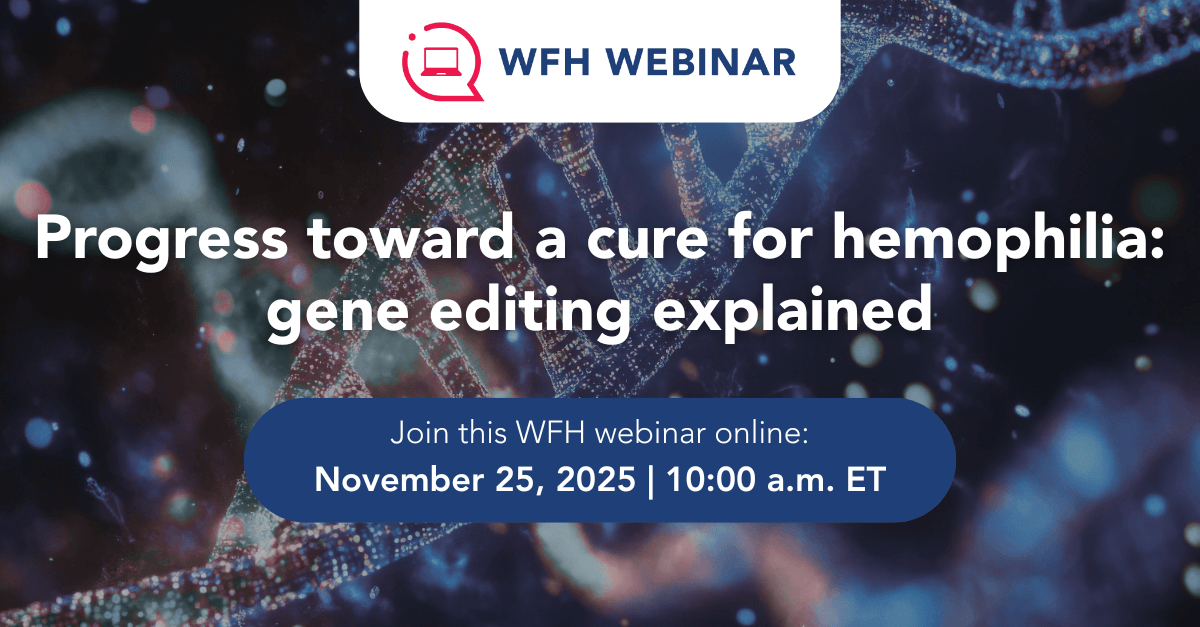
The World Federation of Hemophilia (WFH) hosted an educational webinar titled “Progress toward a cure for hemophilia: gene editing explained”
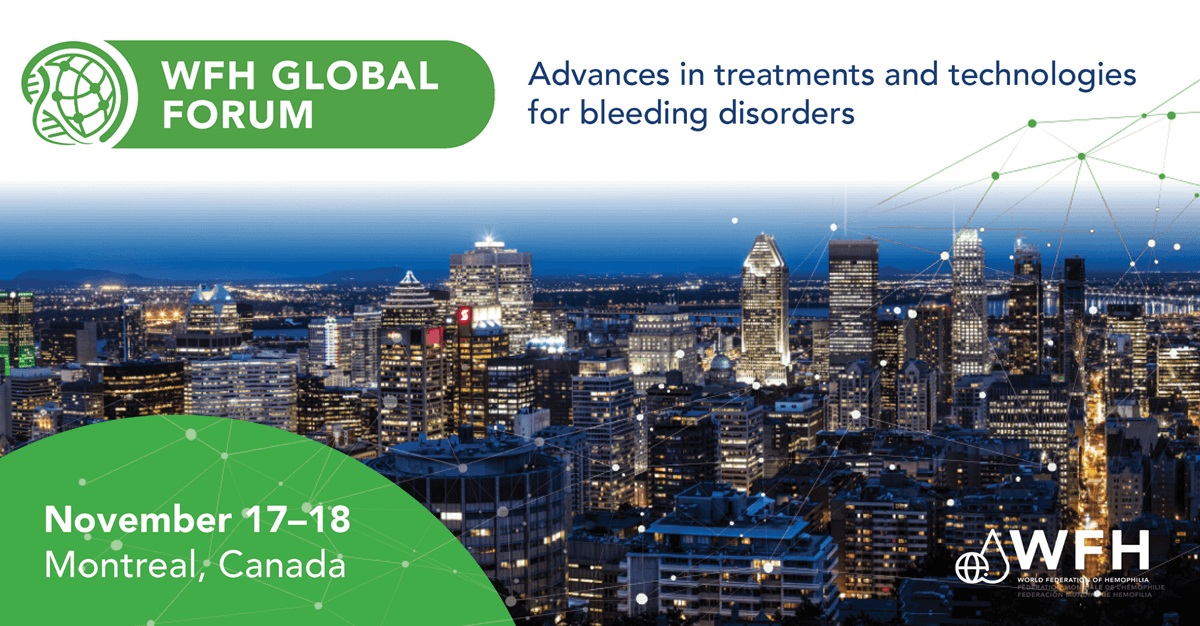
A summary of discussions held at the Thirteenth WFH Global Forum on Research and Treatment Products for Bleeding Disorders which
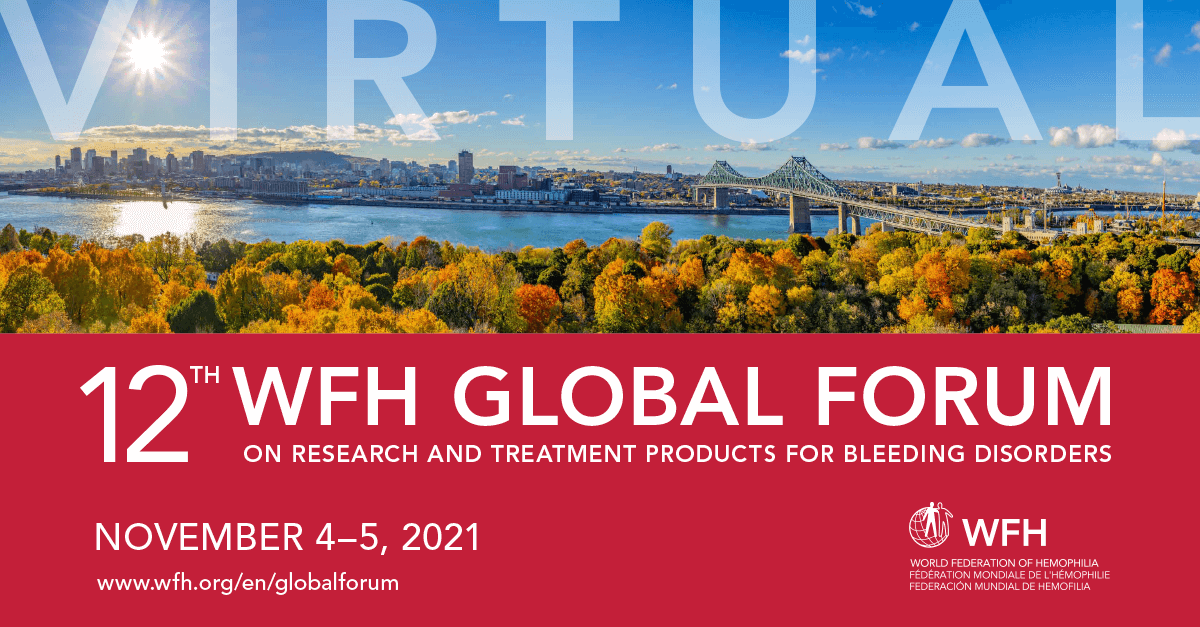
A summary of discussions held at the Twelfth WFH Global Forum on Research and Treatment Products for Bleeding Disorders which
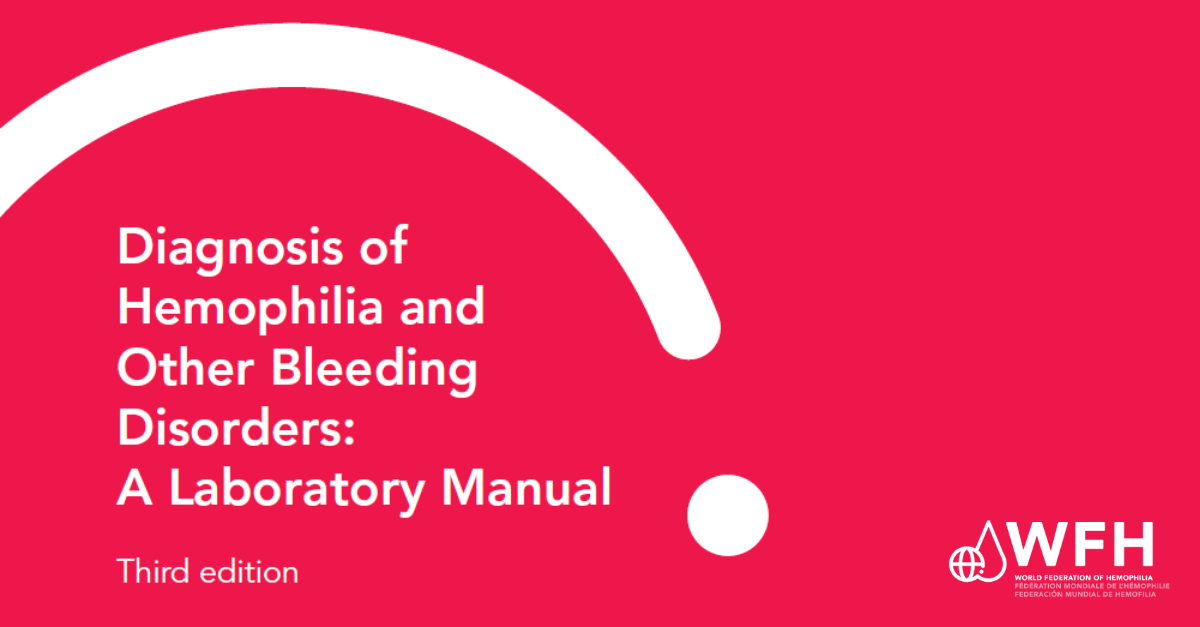
The 3rd edition of the WFH laboratory Manual is the definitive how-to guide for the accurate diagnosis of hemophilia and
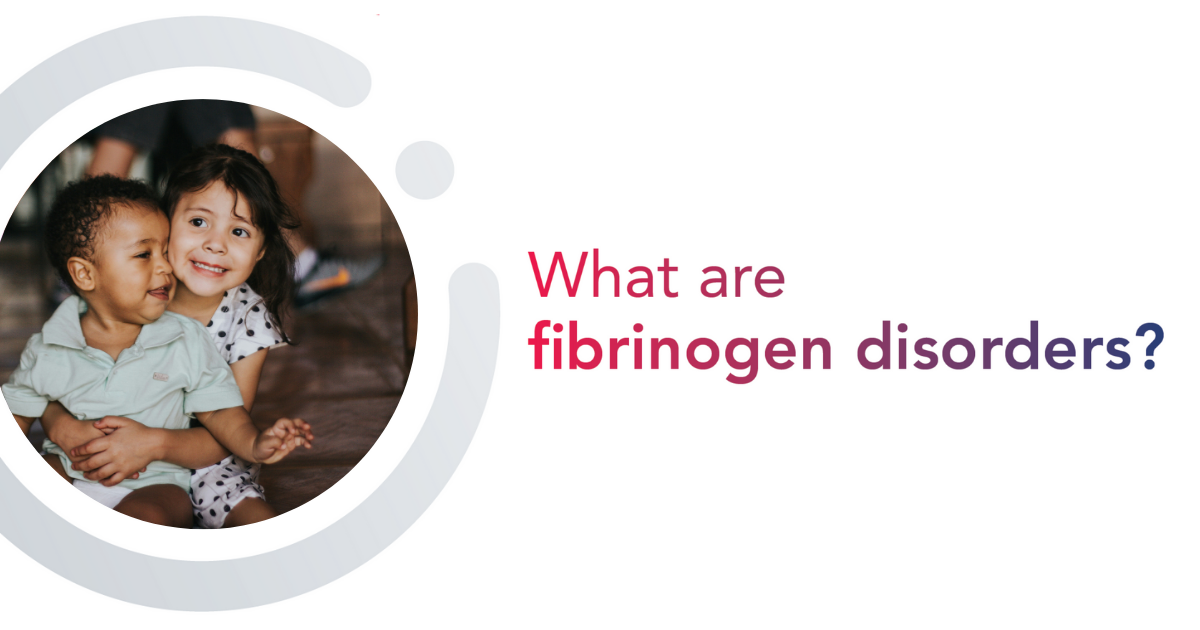
This patient handbook contains basic information about the inheritance, diagnosis, symptoms and management of fibrinogen disorders, including afibrinogenemia, hypofibrinogenemia, dysfibrinogenemia